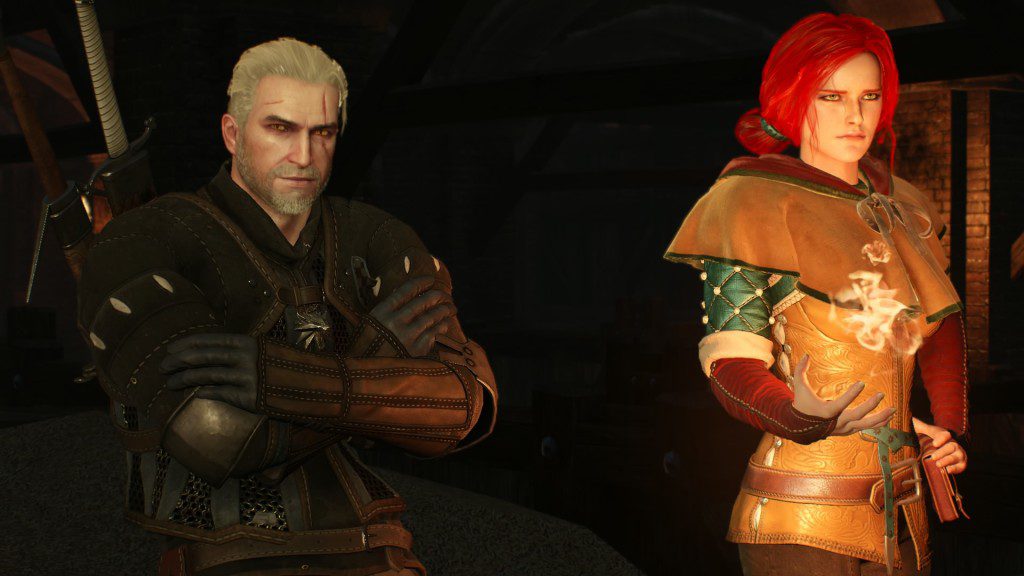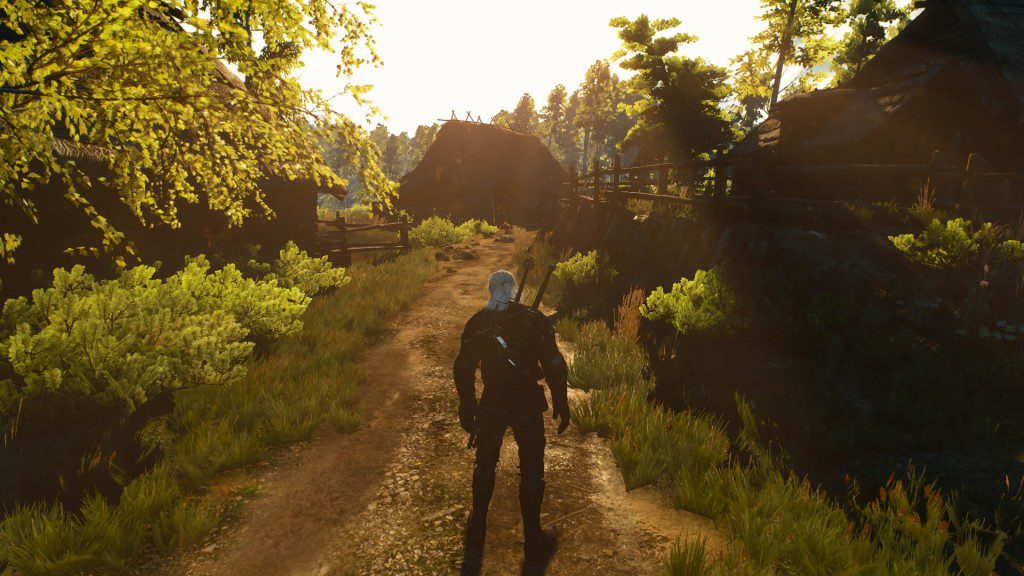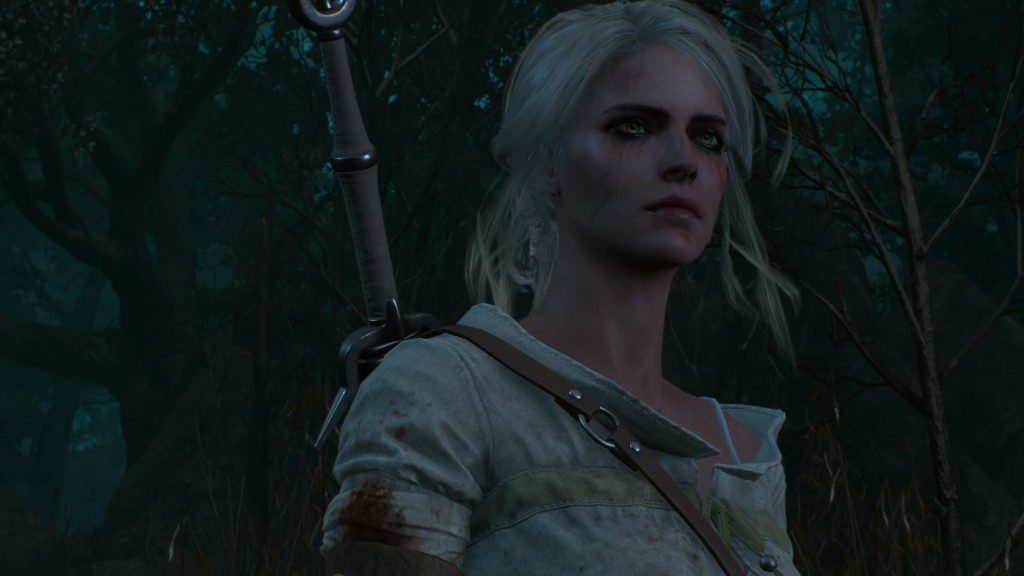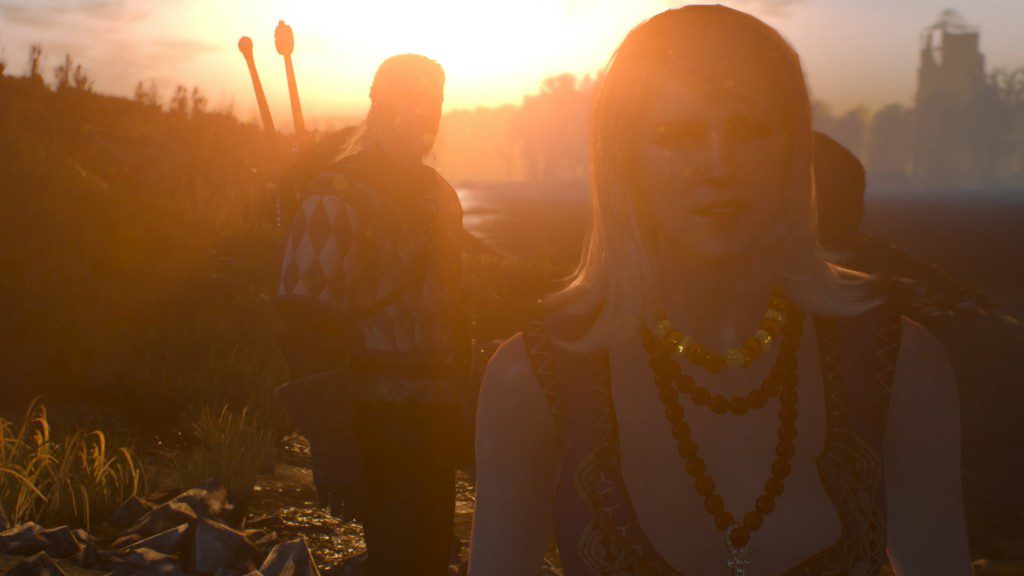Standing on the borders of the idyllic White Orchard, sun at your back, clouds ambling softly across the pastel sky, the many woes of the Northern Realm may be the furthest thing from your mind. For as the fires of a civil war rage in the distance, and the pious puppet masters scheme and plot in the shadows, White Orchard seems removed from it all, a bastion of lush greenery and placid waters devoid of any such ills. But to walk among the denizens of any township within its confines is to sample the reality of this much maligned world anew. Drunkards bash and brawl from the barstool to the cobbled path, while spit and rotten apple cores line the streets at your feet. These are the detractions of the scared and the hopeless, those who see a Witcher as a bringer of blight rather than of restitution, and those whose lives have fallen into a deep, unavoidable rut.
Life in the North is one of hardship, poverty, death and pestilence, but perhaps most frightening of all, it is one of acceptance. Cohabitation with monsters and marauders alike is simply part of life in The Witcher. And if it wasn’t evident enough by witnessing an entire city relish in the burning of its heretics, or a village torn asunder by a pack of carnivorous wretches, then you need only read the joyless, apathetic expressions of those you encounter on your travels to know more of the lands darkened history.
Geralt of Rivia trudges down from the icy hills of his Kaer Morhen home knowing full well what awaits him. Geralt, you see, is a Witcher, a genetically modified warrior born of an age-old caste whose purpose it is to quell the monstrous plague by any means, so as long as there’s gold coin involved. It’s from Geralt’s perspective that we will see the events of The Witcher III: Wild Hunt play out, a perspective that lends greatly to the many woeful tales that you will unwittingly become a part of. Geralt isn’t just defined by his unique job description, nor the dual blades slung around his neck, but also by the company that he keeps. Geralt, like all of his Witcher cohorts, is a pillar of neutrality in a world of devout allegiances. He is neither sworn to the North, the Nilfgaardian army or the Scoia’tael, but is instead a mercenary profiting directly from the collective fear and helplessness of the lands many ailed, such is the creed of his ilk. It’s this neutral viewpoint though that helps truly convey the horror endemic to Temeria, for if the ghouls at the door weren’t terrifying enough, then the indoctrinated cultists, maniacal kings, bloodthirsty hunters and devilish assassins, all seen through Geralt’s untainted eyes, are ample justification for the continued unsheathing of his sword.
Geralt may be many things; a master swordsman, a terrible improvisational actor, and a man who’d sooner gulp down a vial of purple fluid than take another arrow to the chest. But he is far from being as numb to the lay of the land as some of those he’ll meet in each of the North’s four corners. Geralt’s stoic expression and sharp witticisms simply stem from his experience with the ruination around him.
TREES CREAK, WINDS HOWL, FORESTS MOAN. TERROR IS ABOUNDING.
His artificially prolonged life means that he has passed the point of ever being surprised by what hellish bane lies ahead of him, whilst his encyclopaedic knowledge of his enemies and methodical approach to monster slaying has been delicately honed to the point of near-perfection. Geralt is simply a product of the abounding depravity, and as such, it makes him an easy target for those looking for someone to scold with their ire.
Each and every quest, story and snippet of lore within the Witcher III plays to the natural horror that suffocates its many cities and hovels. People are scared and in need of help, and as long as the fear of being dragged off into the woods kicking and screaming remains, Geralt’s skills will still be available to rent. Quests in the Witcher III, be they a Witcher contract, treasure hunt or even a deeper look into the majesty of Gwent are all equally dynamic, with even the smallest of endeavours helping the ground beneath your feet continually expand. Partly because each quest is so unpredictable, and partly because the emotions of Geralt and company are so evocative, every interaction feels both responsive and fulfilling. For both the grief-ridden widow and the xenophobic town guard are each as believable as one another, and each a deliberate part of the Witcher’s harrowing air of dread.
Most evident though is the lack of reliance on many of the genres more weathered tropes. The Witcher III has both fetch quests and escort missions within its repertoire, however neither are ever generic and simplistic enough to fall into predictable patterns. An order to go and cull a nearby bandit camp can quickly turn into an impromptu rescue mission once you realise they have a merchant locked up against his will, whilst a simple quest to go and locate a missing person may see you become quickly embroiled in the diverse bounds of lycanthropy and adultery. Evil takes many forms in the world of the Witcher, for as you’ll come to realise, the more that you involve yourself in the lives of men, the easier it may be to find very little left to save.
Geralt is not alone in his pursuits however, with a host of cohorts and accomplices ready and willing to assist him. The primary goal at the heart of the Witcher III is to find and locate Cirilla, Geralt’s adoptive daughter, and free her from the harm that may be coming her way. In doing so, Geralt will need to jump through hoops and bow to the whim of those who are reluctant to part with any relevant information for free, with his journey across the planes funded by a river of blackened monster blood and the spoils of an unholy war.
Every interaction within the Witcher III has a purpose, with the many soldiers, shopkeepers and sorceresses that dwell within the Northern Realm battling their own troubles and misfortunes. The crop of rambunctious characters within the Witcher all provide uniquely different outlooks on the lands current climate, with the tellers of these tales as easy to hate as they are to empathise with. You may become embroiled in the plot to assassinate a king at dawn, before rounding off your day by chasing rare trading cards across the city by the light of the moon, all the while becoming increasingly tangled up in the lives of those both powerful and insignificant. And much like many of the people that he seeks to relieve of information, Geralt too is prone to bouts of impetuousness and anger. One of the Witcher’s biggest strengths is that you can force Geralt down the paths of greed, dishonesty and truthfulness in equal measure, with our all-powerful protagonist prone to the very same flaws indicative as the lands human populace. It’s why unravelling the motives behind some of the Witcher’s more perplexing characters is so satisfying, for if Geralt is just as vulnerable and comprehensible and as they are, then there’s always a need to choose your words with a certain degree of care.
And should you fail at bargaining with the bandit clan that you stumbled across in the fallow mire, then you can always rely on a trusty sword stroke and abundance of homemade explosives. The Witcher’s combat is typically visceral, with the reliance on swordplay at its core. Different enemies in the world of the Witcher require that you dispatch them in different ways however, for what may be the bane of a mortal could be nothing more than a minor inconvenience for a hulking rock troll. Dabbling in the art of alchemy then is a necessity for your continued survival. Bombs, oils and potions aim to give you the extra edge in combat, their recipes scattered throughout the swamplands and caves of the North, simply waiting to be found. Battles prior to having an abundance of ordnance can seem initially daunting as you entertain cautiousness over anything else, rationing pieces of chicken and pints of lager at times when you’re in need of a slight boost in health. But from the moment that you’re faced down by a gang of rotting flesh-rippers standing guard over a cache of much needed equipment, sword dripping in oil, an attack potion quickly working its way through your bloodstream, things become drastically more varied.
A rare potion may have once seemed like a welcome bonus, but as Geralt continues to improve with each blow landed and each enemy culled, they’re now somewhat integral to his fighting style. Evading a flailing claw with a well-timed roll, then inhaling a pre-made potion before charging back into the fray may catch a clutch of foes unprepared, giving you enough time to coat the sky with severed appendages and liquid red. The greater Northern Realm is absolutely brimming with encounters such as these, with your map positively smothered by icons and waypoints vying for your attention.
DIPLOMACY OR DEATH; YOUR CHOICES AREN’T SOON FORGOTTEN
The simple act of taking a boat down the coast may lead you to stumble upon one of the games closest kept secrets, with the extended history of the world prior to your arrival etched and carved into every field and forest. The environments of the Witcher are as diverse as they are terrifying, but they are never without a story to tell. Evil in the Witcher isn’t ever too far away, with the sun glazed pastures and sodden rock quarries bearing equally darkened pasts.
As I mentioned prior, the culture of fear alive and well in the Witcher III plies extra emphasis on the need for detraction, with even our weathered protagonist needing to dull his senses every once in a while. It’s at moments of relative calm when the scope of the Witcher is most evident. As the lands burn around me, here I am, contently listening to a bard strum a heart-wrenching melody in a tavern only mere meters away from a freshly outed pyre, smouldering corpses still atop of it. The Witcher is forever in ascension, each wonderfully acted scene trying to eclipse the one before it, and yet these interludes between grand and game-defining battles resonate just as well as its many finales and neat conclusions. Be it in a game of Gwent, a horse race, or a fight to the death in the hallowed arena of a madman, the Witcher remains a consistently fulfilling testament to both boundless freedom and sublime pacing.
The Witcher III: Wild Hunt is a remarkable feat. It doesn’t just utilise many of the themes and tools abundant within the RPG genre, but accentuates and refines upon them unreservedly. The rigid structure of the narrative remains unbroken throughout, guiding the player across the choppy waters of both political strife and a monstrous uprising, without ever demanding your attention. Should you choose, you can easily assume the role of the lone wanderer, putting the quest to find Ciri on the back-burner whilst you wade through murky marshes and take assassination contracts some of the realms most nefarious depravities. The lands within the Northern Realm are wrought with chaos and bloodshed, but they aren’t without their beauty either. Charred villages and scorched battlefields will eventually give way to decadent cities and opulent castles, but this would count for little had the world of the Witcher been devoid of depth and vigor. And yet, whether you walk through a bustling town square or the shared shack of a downtrodden family, the Witcher simply exudes life at every instance. You may be at your most content cutting a bloody path through a pack of armed thugs, but its everything beyond the simple blare of war that makes the Witcher III the triumph that it is.
This may be Geralt’s story, but it remains a harrowing depiction of the plight of the entire Northern Realm, and the lives of those affected by a seemingly never-ending bombardment of tragedy. But despite this traumatic existence, the world that CD Projekt Red have built is as vibrant as any I have ever experienced. It may take you a while to sort the deceptive from the just, and the killers from the kind-hearted, but moral ambiguity is just one of the many traits of this horrible, wonderful hyper-reality. A reality that, despite all of the monsters that inhabit it, remains magnificently human.



